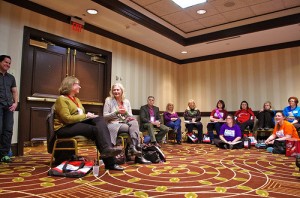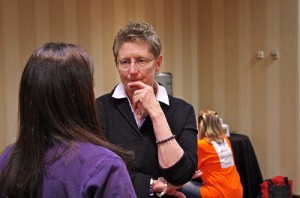Filichia Features: Teachers Learn at Junior Theater Festival ‘14
Filichia Features: Teachers Learn at Junior Theater Festival ‘14
There can’t be many places in the world where an audience applauds after the speaker says, “It’s not a democracy; it’s a dictatorship.”
But here at the Junior Theater Festival in Atlanta, the teachers in a workshop agree with Linda Hartzell that when you’re producing and directing a show, you have to be the one in charge with no questions asked.
“Yes, when you’ve finished casting a show, put the cast list on the door and run, run, run.” She shakes her head sadly from side to side. “Honestly, the sense of entitlement that kids seemed to start having in the ‘90s ...,” she says, letting the statement trail off. She’s not afraid of saying too much; she just doesn’t want to get herself in a bad mood.
The workshop is called “Oh, the Thinks You Can Think!” in honor of Seussical's opening number. It’s one of more than a dozen that will be held in function rooms around the Renaissance Atlanta Waverly Hotel & Convention Center that plays host to the festival each January.
Hartzell, the artistic director of Seattle Childrens’ Theatre, and Rosemary Newcott, who works in the same capacity for Theater for Youth at the Alliance Theatre Company here in town, have a good deal of good advice to dispense to the dozens of teachers who are here to make their strong theater programs even stronger.
Hartzell is a good role model. Of course she started small when she began in 1984. “But now I’m 100% Equity and IATSE, and two-thirds of my cast have MFAs in acting,” she says. ” Her intention is not to brag, but to establish the facts and truths that are meant to inspire. She knows she doesn’t have to add “If I can do it, you can do it,” because the sharp and eager faces in the room show they believe her and do plan to have goals as lofty as the ones she’s achieved.
Teachers who’ve worried that they’re too slow are buoyed by Hartzell’s statement that “A minute on stage takes an hour of rehearsal.” As a result, time is precious stuff. “So,” she says, “you have to glean very quickly who needs feedback all the time -- and who’s dyslexic. I can tell when the blood sugar is low and they need a break, which usually comes at the hour-twenty mark.”
She offers alternative looks at direction. (“Directors of Japanese theater never block a new scene without going over what’s already been blocked before.”) She also admits that when she wants an actor to do a certain move or intonation, she isn’t above saying, “I love what you did yesterday” before describing something that he hadn’t done, but something she’d like to see him do. “That’s the way to get actors to do what you need – by letting them think it was their idea.”
Newcott has a different way of handling that situation, but one that sounds equally valid: “I won’t give an actor a line reading,” she says, “but I will say, ‘What word in that sentence is the one that the audience most needs to hear?’ And they usually wind up saying a line the way I’d like to hear it said.”
Hartzell lays down the theatrical laws. “Do not let actors give each other notes,” she insists. “Tell them not to take notes from other people, either. And while you’re at it, don’t allow parents in the green room. Your life will be easier for it.”
Newcott trumps that ace. “In essence, I audition the parents. They don’t know that I’m auditioning them, but that’s what I’m doing. I want to make certain that I’m going to be able to work with kids whose parents will give me the least amount of interference.”
“At this level, I don’t recommend replacing an actor.” So Hartzell’s dictatorship may be like the one that Carol Channing always says that Gower Champion had when doing Hello, Dolly! – “a benign dictatorship.”
She certainly proves it when she says, “We’re making America a better place and are making life worth living.” Heads in the audience move up and down like bobbins in a fish pond.
In the “Hard Work Workshop,” Deirdre Kelly Lavrakas, a teaching artist with the John F. Kennedy Center for the Performing Arts, asks the teachers “How many of you were up at five?” And virtually everyone raises a hand. Lavrakas admits that she was, too.
Considering that it’s now 4:15 p.m. Lavrakas has every right to be more than a bit tuckered. But she’s strong and resolute when she delivers her mantra: -- “Focus, ignite and edit” – with the zest of “Bend and Snap” from Legally Blonde. Among the tips she dispenses is “When I’m doing lighting, I do it with the lighting designer alone. I will not have kids stand around doing nothing.” The pointed look she then gives the crowd suggests that “kids doing nothing” often leads to “kids doing something” and that “something” isn’t anything good.
Sunday morn brings a workshop designed to teach everyone to “Design on a Shoestring Budget.” (It’s also called “Put It in the Piggy,” in honor of the song in Dear Edwina, Jr.)

Cindy Ripley, representing iTheatrics and MTI, is a vigorous and entertaining speaker who enthusiastically shares the tricks of her trade – which include trading. “Don’t underestimate how much merchants will be glad to be thanked in your program, so ask them to give you or loan you whatever you need.”
Yes, chutzpah is important. Ripley has even made friends with people who work at landfills, asking them to keep an eye out for whatever she needs for her next production. She doesn’t depend on their attention or co-operation, however; she heads out on her own to such places, and often finds items that she didn’t even know she could use – not until she actually sees them sitting there.
One man’s mistake is another man’s opportunity. Hence, Ripley urges everyone to check local paint stores for cans of mixed paint that didn’t turn out to be q-u-i-t-e the color that the customers wanted. She’s seen many a can sitting forlornly in a corner, orphaned for life until she adopts it – “sometimes for free, sometimes for a fraction of the price.” Ripley finds that that off-white that was too off for the customer was right-on for her, and that the once woebegone contents of a can can get a good on-stage home.
Those doctors who specialize in hernias won’t be happy to hear that Ripley thinks flats should not be made of solid wood, but that the wood should be limited to strips used on frame outlines that can then be covered with canvas or sheets. As for those sheets, Ripley says that they can be easily had at no cost simply by going to local hotel and motels and asking the housekeeper for sheets that have a tear or cigarette burn. While they’ve been retired because they’d make a bad impression on a finicky hotel guest, they’ll be far enough upstage where an audience won’t notice the ruptures.
“Remember that objects don’t necessarily need to be what they are,” she says. “They just need to suggest what they are. And failing getting something handed down at no cost, ask to borrow.”
While your local Chamber of Commerce or Convention and Visitors Bureau may not state where the Goodwill Thrift Shops are, you need to locate each and every one. “If you’re doing a period piece,” says Ripley, “you might very well find the clothing you need that had been donated because it’s so out-of-style and out-of-fashion that no one in his right mind would wear it. Your characters, however, would.”
No piece of a piece of clothing is too small for Ripley. “Keep scraps,” she urges. “If you must slice up that sweater to make a sweater vest, don’t throw away the sleeves; you can use them later on characters who are supposed to be wearing leg warmers.”
David Letterman may be famous for his Top Ten, but Ripley has her Top Four for what is needed to hold everything together. Number four: Goop adhesive; Number three: safety pins; number two: a glue gun. And the number one answer in what is needed to hold everything together is duct tape.
Some are surprised. “Hemming a skirt,” she informs, “is much easier if you use duct tape.”
And what else can you get for free? “Never underestimate parent labor,” she says staunchly. “Some parents will be very glad to help.”
That spurs one teacher to turn to another and whisper, “And that’s how I got into theater in the first place – just by helping my kid’s teacher.” The smile that she gives after her statement is positively beatific. Neither duct tape nor a glue gun is required to keep it in place.
 You may e-mail Peter at pfilichia@aol.com. Check out his weekly column each Tuesday at www.masterworksbroadway.com and each Friday at www.kritzerland.com. His new book, Strippers, Showgirls, and Sharks – a Very Opinionated History of the Broadway Musicals That Did Not Win the Tony Award is now available at www.amazon.com.
You may e-mail Peter at pfilichia@aol.com. Check out his weekly column each Tuesday at www.masterworksbroadway.com and each Friday at www.kritzerland.com. His new book, Strippers, Showgirls, and Sharks – a Very Opinionated History of the Broadway Musicals That Did Not Win the Tony Award is now available at www.amazon.com.



























